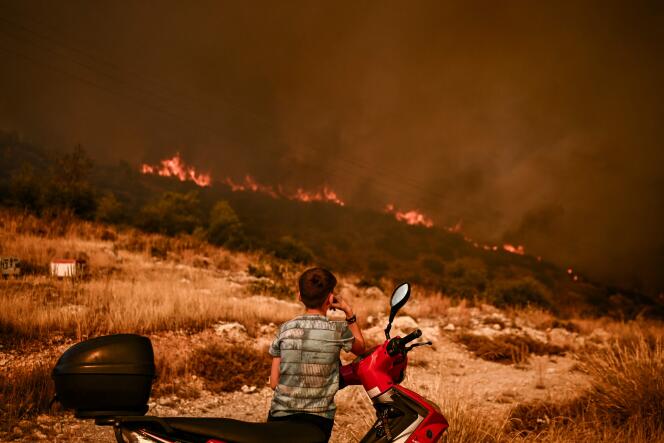


On the night of Tuesday, August 22, Athens went to sleep surrounded by flames, the sky gray with ash. In the working-class district of Ano Liosia – northwest of the capital – 25,000 residents had to be evacuated. In the neighboring district of Fyli, buildings were engulfed in flames. Still to the west of the capital, in Aspropyrgos, an entire industrial zone containing logistics platforms, refineries, chemical plants and an army air base was threatened by the blaze. Part of Mount Parnitha National Park, one of the densely green lungs of Attica – the Athens region – was also caught in the fire, forcing authorities to close several roads and order evacuations.
"The situation is unprecedented, weather conditions are extreme," fire department spokesman Yiannis Artopios worried on public TV channel ERT. The fires "have grown to enormous size in a short space of time," he added. "The next 48 hours are proving extremely complicated due to strong winds and high temperatures [up to 41°C]. The outbreaks cannot be easily brought under control," Civil Defense Minister Vassilis Kikilias stressed on Tuesday, August 22.
A month after fires that already claimed five lives and ravaged 18,000 hectares on the island of Rhodes, Greece is once again facing destructive blazes that have ravaged over 40,000 hectares in three days, according to the National Observatory of Athens. Some 92 new fires and 14 major fronts mobilized firefighters on Tuesday in Attica, in Boeotia, in the Peloponnese, in northeastern Greece, in the center of the country, and on the islands of Evia and Kythnos.
The situation remained particularly critical on the evening of Tuesday, August 22, in the north-east of the country – on the Greek-Turkish border – where 19 migrants, including two young children, lost their lives in fires that had been raging for four days. On the evening of Monday, August 21, a shepherd was killed in the central region of Boeotia.

That same Monday evening, the flames reached the large border town of Alexandroupoli, which is home to an American base. The city's 73,000 inhabitants were gripped by fear overnight as the town's hospital had to be urgently evacuated. Of the 204 patients, around 60 – the most serious cases, including newborn babies – were transported by ferry to another hospital in the eastern town of Kavala. "Everything happened very quickly. We could see the flames coming closer from the hospital courtyard. The atmosphere became suffocating," Christodoulos, a nurse, explained.
You have 50.95% of this article left to read. The rest is for subscribers only.
